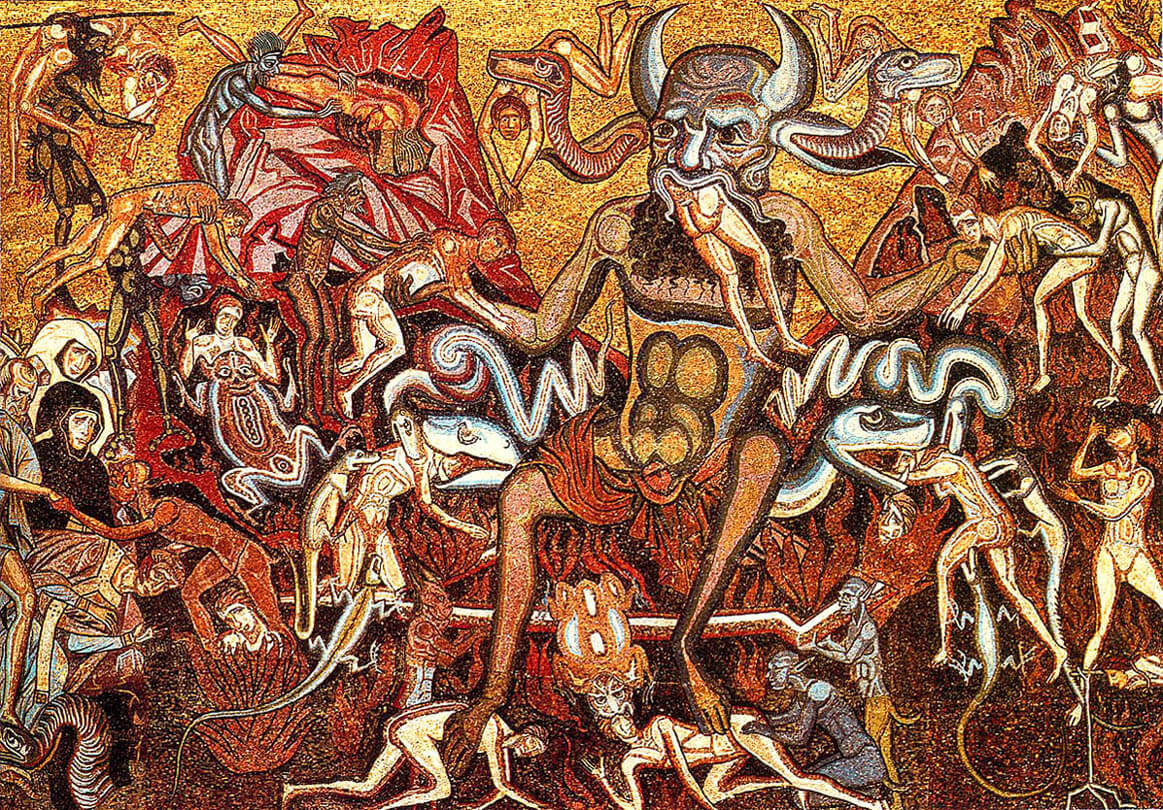Image: Coppo di Marcovaldo, The Hell (c. 1301)
In our 9 October report about recent comments made by papal confidant Fr. Antonio Spadaro as regards the moral law, we added a post-publication update about a new conversation between Pope Francis and Eugenio Scalfari. Scalfari, who has become a favorite interviewer of Pope Francis, is the atheist founder of the Italian newspaper La Repubblica, known for his unconventional method of reconstructing interviews from memory, rather than using direct quotations. (Although Scalfari’s recounting of the pope’s more controversial words have thus often been dismissed by members of the Catholic press as unreliable, the pope’s insistence in continuing to seek out Scalfari for candid interviews and on-the-record discussions should put to rest any claim that he has been misrepresented.)
In the latest instance, while reviewing Archbishop Vincenzo Paglia’s new book, Scalfari quotes the pope as saying that among the bishops of the Catholic Church there is a lot of relativism. Scalfari then quotes Francis as saying*:
We believers and of course above all we priests and we bishops believe in the Absolute, but each in their own way because each one has his own head and thought. So our absolute truth, shared by us all, is different from person to person. We do not avoid discussions in the case where our different thoughts confront each other. So there is a kind of relativism among us as well. [emphasis added]
Scalfari then adds his own thoughts about the pope’s and Archbishop Paglia’s own distinct idea that hell is empty:
Pope Francis, preceded in this [view] by John XXIII and Paul VI, but, with a more revolutionary force with respect to ecclesial theology, has abolished the places where, after death, souls must go: Hell, Purgatory, Paradise. Two thousand years of theology have been based on this kind of afterlife, which even the Gospels confirm. However, it is with some attention to the theme of Grace — that is in part due to the letters of Saint Paul (to the Corinthians and the Romans) and partly even more so to Augustine of Hippo. All souls are endowed with Grace, and so they are born perfectly innocent and they remain so unless they take the path of evil. If they are aware of it and do not repent even at the moment of death, they are condemned. Pope Francis, I repeat, has abolished the places of eternal dwelling in the afterlife of souls. The thesis held by him is that the souls dominated by evil and not repentant cease to exist while those who are redeemed from evil will be assumed into beatitude, contemplating God. This is the thesis of Francis and also of Paglia. [emphasis added]
As Vatican expert Sandro Magister has reported before, Scalfari previously quoted Pope Francis as saying: “In a millennium or so our human species will be extinguished and souls will merge with God.”
And in 2015, Pope Francis was again quoted by Scalfari: “What happens to that lost soul? Will it be punished? And how? The response of Francis is distinct and clear: there is no punishment, but the annihilation of that soul.”
These quite heretical statements that are attributed to Pope Francis himself — and which he still has not publicly denied — are now also attributed to the new head of the Pontifical Academy for Life and Grand Chancellor of the re-organized John Paul II Institute on Marriage and Family Sciences. His new book, therefore, should be carefully studied and analyzed.
In context — under the premise that there is no eternal punishment for sin anymore — this new Bergoglian era now makes much more sense. If Hell is not to be feared, what impediment is there to keep us from moving in the direction of moral relativism and doctrinal laxity?
It thus becomes more urgent for faithful Catholics who are determined to remain loyal to the traditional teaching of the Catholic Church to continue, in their own organizations and publications, to resist such violations of God’s truth which are already producing grave effects on the moral behavior of Catholics with regard to contraception, abortion, and adultery. Professor Josef Seifert has laid his finger into the wound of Pope Francis’ teaching, namely: that there seems to be no intrinsically evil act any more.
*Translation by Andrew Guernsey


